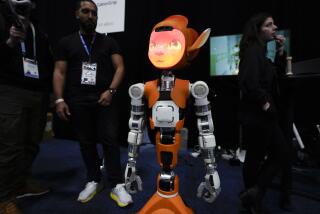Digital Chicken Little
- Share via
Visit the International Consumer Electronics Show, which began Monday in Las Vegas, and you can see sales representatives hawking new digital entertainment gadgets that let people mix content drawn from the Web, television, radio, music CDs and movie DVDs. These devices, although still unavailable in most stores, are already striking fear in the heart of the entertainment industry.
The industry has every right and obligation to vigorously defend its copyrights. But some of its leaders are pressing for restrictions that could end up hurting their business by turning off customers. Their knee-jerk opposition to allowing consumers to copy digital media has delayed revision of copyright laws for the digital era. That has prevented manufacturers from distributing new digital technologies, deepened the consumer electronics industry’s current sales slump, slowed the deployment of high-speed broadband Internet access and halted the transition to digital TV, which is already years behind schedule.
Instead of suing to keep customers from “burning” CDs the way they used to record cassette tapes, or instead of imprinting highly restrictive and glitch-ridden anti-theft protection on every song or movie scene, industry leaders should vigorously work with the consumer electronics companies to develop ways to guarantee a fair profit when people download and then copy or otherwise alter digital content for personal use.
One scheme, for example, would allow a record company to charge for music in an all-you-can-eat bundle, much as AOL does for monthly access to its content.
In an opinion piece published last month in the online magazine Salon, Paul Boutin, an editor at Wired magazine, accurately summed up the challenge now facing entertainment companies: “Remove the incentives for people to steal, rather than imposing more technology that treats customers as would-be shoplifters.... Instead of telling us not to steal, how about just giving us a way to pay?”
There was a time when book publishers worried that Xerox copiers could destroy their industry. And when television producers predicted that videotape would chase off advertisers because time-shifters could zap commercials. Now Chicken Little lives in the entertainment industry. Copyrights are precious, but fighting last year’s war won’t protect them.






